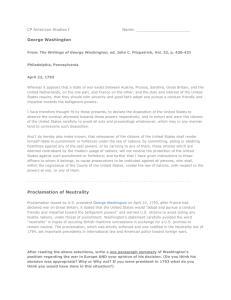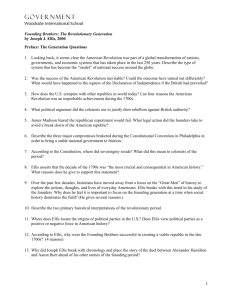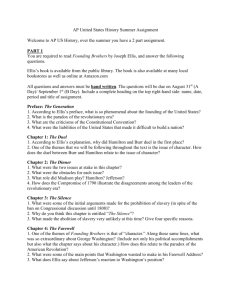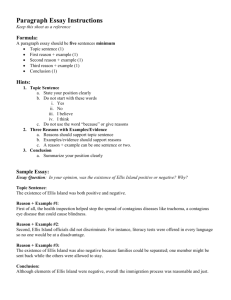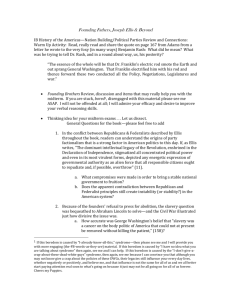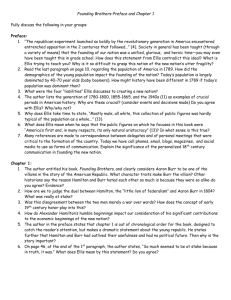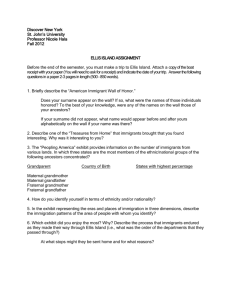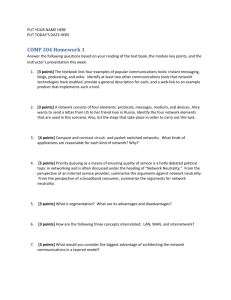George Washington: Shaping the Presidency Video Questions 1
advertisement
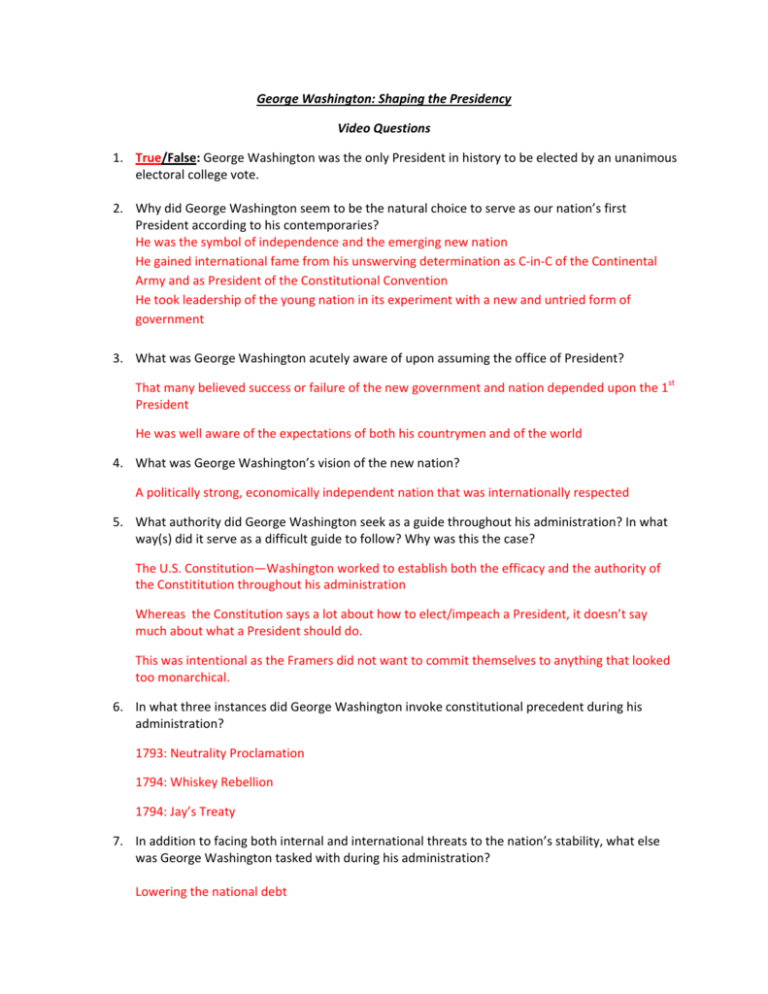
George Washington: Shaping the Presidency Video Questions 1. True/False: George Washington was the only President in history to be elected by an unanimous electoral college vote. 2. Why did George Washington seem to be the natural choice to serve as our nation’s first President according to his contemporaries? He was the symbol of independence and the emerging new nation He gained international fame from his unswerving determination as C‐in‐C of the Continental Army and as President of the Constitutional Convention He took leadership of the young nation in its experiment with a new and untried form of government 3. What was George Washington acutely aware of upon assuming the office of President? That many believed success or failure of the new government and nation depended upon the 1st President He was well aware of the expectations of both his countrymen and of the world 4. What was George Washington’s vision of the new nation? A politically strong, economically independent nation that was internationally respected 5. What authority did George Washington seek as a guide throughout his administration? In what way(s) did it serve as a difficult guide to follow? Why was this the case? The U.S. Constitution—Washington worked to establish both the efficacy and the authority of the Constititution throughout his administration Whereas the Constitution says a lot about how to elect/impeach a President, it doesn’t say much about what a President should do. This was intentional as the Framers did not want to commit themselves to anything that looked too monarchical. 6. In what three instances did George Washington invoke constitutional precedent during his administration? 1793: Neutrality Proclamation 1794: Whiskey Rebellion 1794: Jay’s Treaty 7. In addition to facing both internal and international threats to the nation’s stability, what else was George Washington tasked with during his administration? Lowering the national debt Establishing a viable banking system Appointing the Supreme Court Establishing relations/treaties with the Amerindians in order to open the American West to settlement. 8. What did George Washington write to the English historian Catharine Macauley Graham shortly after becoming President? That he walked on untrodden ground 9. What was George Washington acutely aware of with regard to his every action and decision? That his actions/decision as the nation’s first President would set precedents for those who succeeded him 10. What challenges and/or struggles did George Washington face as President? He had to ensure that every aspect of the President’s policies/lifestyle conformed with the ideals of republicansim 11. What created much controversy for the new government? Why? Matters pertaining to Presidential etiquette and George Washington’s social life—resulted from the fact there was nothing concrete or established that Americans could visualize when thinking of their nation, except George Washington and, through him, the office of President 12. What did George Washington’s first term focus largely on? Organizing the executive branch of the new government and establishing administrative procedures that made it possible for the government to operate with the energy and efficiency George Washington believed was essential to the success and survival of the new republic 13. Given the failures of the Articles of Confederation, George Washington firmly believed that the federal government, as the embodiment of all the people and the States in union, should be supreme. What did Washington do to maintain and reinforce this distinction? He was careful not to subordinate himself to State officials 14. What do many historians agree George Washington’s brilliance lay in? His ability to listen to opinions (often diverse) and set a course of action 15. What is considered among George Washington’s most important precedents? Why did Washington establish such a precedent? Establishing a Cabinet of trusted advisors—Washington deliberately selected experienced men who held diverse points of view because he believed they would provide him with the perspective(s) from which he could make strong decisions Washington chose people on the basis of talent According to Ellis, Washington had a tremendous eye for talent—that is, he was very astute in selecting who his key advisors were 16. What did George Washington become increasingly concerned about towards the end of his first term of office? The increasing partisanship within the government 17. What were George Washington’s feelings with regard to political partisanship? He despised political partisanship GEORGE WASHINGTON, letter to Timothy Pickering, Jul. 27, 1795: Much indeed to be regretted, party disputes are now carried to such a length, and truth is so enveloped in mist and false representation, that it is extremely difficult to know through what channel to seek it. This difficulty to one, who is of no party, and whose sole wish is to pursue with undeviating steps a path which would lead this country to respectability, wealth, and happiness, is exceedingly to be lamented. But such, for wise purposes, it is presumed, is the turbulence of human passions in party disputes, when victory more than truth is the palm contended for. However [political parties] may now and then answer popular ends, they are likely in the course of time and things, to become potent engines, by which cunning, ambitious, and unprincipled men will be enabled to subvert the power of the people and to usurp for themselves the reins of government, destroying afterwards the very engines which have lifted them to unjust dominion…. The common and continual mischiefs of the spirit of party are sufficient to make it the interest and duty of a wise people to discourage and restrain it. It serves always to distract the public councils and enfeeble the public administration. It agitates the community with ill-founded jealousies and false alarms, kindles the animosity of one part against another, foments occasionally riot and insurrection. GEORGE WASHINGTON, letter to Thomas Jefferson, Jul. 6, 1796: I was no party man myself, and the first wish of my heart was, if parties did exist, to reconcile them. Washington described partisanship as “dissident noise” that needed to stop 18. What was one of George Washington’s primary goals as President? To establish a national character free of sectional differences Uniting the resources and energies of all the people and the states Transforming the United States into a singular instead of a plural noun Creating a sense of nationhood 19. How did George Washington attempt to develop stronger national unity while serving as President? Why was national unity important to George Washington? He visited every State in order to bring Americans “face to face” with their new federal government He visited the northern states in 1789 and the southern states in 1791 20. What was the only State that Washington did not visit during his tour of the “nation”? Why? Rhode Island b/c it had not yet ratified the U.S. Cosntitution (he did go back once they ratified it and joined the Union) 21. What did Washington’s tour of the nation convince him of? The new government enjoyed the general support of the American people 22. What did George Washington plan to do at the end of his first term? How/Why did he change his mind? Why did Washington refuse a third term? Had Washington decided to stand for a third term, does Joseph Ellis think he would have been re‐elected? Why is his refusal to serve a third term considered an important precedent? How long did most Americans believe Washington would serve as President? Step down because he was convinced the new government could make do without him. He changed his mind because his Cabinet convinced him that his presence was essential for the new government to remain on a steady course Ellis believes Washington would have been re‐elected had he decided to stand for a third term Washington’s refusal to serve a third term is considered an important precedent because (according to Ellis), “Washington wanted not to die in office [since] that’s what kings do….[and] he wanted to say he was a republican and not a king….That as indispensable as he was he was also disposable.” Most Americans believed he would remain in office until he died (they thought he was the only person who could embody the nation) 23. What issue(s)/challenge(s)/area(s) dominated George Washington’s second term of office? Foreign affairs (the French Revolution and the Napoleonic Wars) Partisan politics within his administration 24. What foreign policy approach/guiding principle did George Washington pursue? Why? Neutrality (noninterventionism) 25. For what reasons did George Washington issue his Proclamation of Neutrality in 1793? Was his decision based on pragmatism (i.e. in light of the events occurring at the time) or principle (as a general rule)? What was the public reaction to George Washington’s Neutrality Proclamation of 1793? What effect or impact did his Neutrality Proclamation have on relations with France? Explain. Washington wished to safeguard commerce and the nation’s finances Washington firmly believed the nation’s future depended upon an increase in wealth and opportunity that came with commerce and western expansion Washing didn’t think the U.S. had the resources to win another war against Great Britain (the world’s greatest military power at the time) Reaction to Washington’s Neutrality Proclamation was bitter opposition His Proclamation damaged relations with France since they entered into a formal alliance with the U.S. during the American Revolution (i.e. France viewed that almost as an act of war since Washington’s neutrality proclamation effectively abrogated the Franco‐American Treaty of 1778). 26. What is considered to be among George Washington’s greatest accomplishments? Keeping the U.S. free of war, thus giving the nation a chance to grow in strength while establishing the principle of neutrality that would shape American foreign policy for over a century. 27. What did George Washington declare he was “unpracticed in” during his first inaugural address? Did this hinder his efforts during his presidency? The duties of civil administration 28. What adjectives were used to describe what George Washington exemplified in his actions, appointments, decisions, and in the overall exercise of his executive authority? He is considered among the nation’s ablest administrators ever to serve as President He exemplified fairness and integrity in his appointments and decisions He demonstrated a President could exercise broad executive authority without corruption Disinterested virtue He showed restraint when executing laws He established precedents for broad‐ranging Presidential authority He set a standard for presidential integrity rarely met by his successors 29. True/False: George Washington established an ideal by which all Presidents are judged. 30. True/False: During George Washington’s time in office, candidates for public office did not “run” or “campaign” for office, but rather “stood” for public office while letting others (e.g. the press) to campaign for them. 31. What would George Washington think of today’s “politicians”? Washington equated campaigning for office as an act of prostitution and he believed that anyone who promoted themselves for public office were unofficially declaring that they were unfit for public office. 32. How/why did John Adams become George Washington’s Vice President? He finished second in the Presidential election of 1788 33. What was George Washington’s view(s) toward the role/usefulness of the office of Vice President in general and of John Adams in particular? George Washington interpreted/regarded the office of Vice President as an office that was not part of the executive branch, but the U.S. Senate given the Constitutional definition/phrase that the Vice President is to preside over the Senate (although the Vice President cannot speak or vote except in cases of a tie) to mean that attempts to bring the Vice President within the executive branch or Cabinet would violate the principle of separation of powers. Although John Adams didn’t like Washington’s interpretation, he did agree with it. Upon being elected as the nation’s first Vice President, Adams is quoted as declaring: "My country has in its wisdom contrived for me the most insignificant office that ever the invention of man contrived or his imagination conceived." Socially, Washington and Adams had a good working relationship. While Adams had a lot of respect for Washington (especially during Washington’s second term), he had no say in the makings of executive policy. 34. How many tie‐breaking votes did John Adams cast in the Senate as Vice President? 31 35. What other President(s) came close to receiving an unanimous electoral college vote (aside from George Washington)? James Monroe 36. How long did it take before the official results of Washington’s election were known? A little over 1 month 37. How important/effective was the press in the electoral process during George Washington’s time in public office? Both sides relied on the press as their organs/surrogates to campaign form them—the press was very partisan (much like modern tabloids) insofar as they often printed political lies about their opponents especially with the emergence of political parties (1792‐1796) 38. What purpose(s) did the Wednesday afternoon levies/social functions where Americans could meet the President serve? Part court, part home parlor Attempt to send a middle note that was partly royal/aristocratic and partly republican simplicity The levies were described as “stilted” (artificially formal; stiff) 39. True/False: George Washington was the first President to live in the White House? John Adams was 40. Where, when, how did George Washington gain his managerial experience? Running Mount Vernon plantation/estate Commanding the Continental Army 41. What similar system used by George Washington when he was Commander‐in‐Chief of the Continental Army did he attempt to impose when he created they Cabinet system during his first term of office? The Council of War System 42. What role did George Washington envision for his Cabinet? (See above) 43. True/False: John Adams was an official member of George Washington’s Cabinet. 44. Identify the following members of Washington’s first Cabinet: Secretary of State Thomas Jefferson Secretary of Treasury Alexander Hamilton Secretary of War Henry Knox Attorney General Edmund Randolph (though not an official member of Washington’s Cabinet) U.S. Supreme Court Chief Justice John Jay 45. True/False: According to Joseph Ellis, George Washington had a tremendous eye for talent. Ellis thinks Washington was very astute in selecting his advisors 46. True/False: According to the panelists, George Washington was afraid of conflict. 47. What was the method, manner, or style by which Washington had his key advisors provide their opinions and viewpoints? What was often the result of this method or style of leadership? Washington had his advisors submit written opinions without telling them what his opinion was (often resulted in conflicting advise) 48. Who referred to George Washington as “the hub of the wheel”? Thomas Jefferson 49. George Washington’s Cabinet members had more/less access to the chief executive than Cabinet members do today. 50. Why does Joseph Ellis think foreign policy and relations with the Amerindians superseded relations with either France or England? 51. Did George Washington set any important precedent(s) when he called out the militia to put down the Whiskey Rebellion? According to the panelists, none (at least in the long term), although it did give Washington an opportunity to show the country he was the nation’s C‐in‐C AND President (chief executive or law enforcement officer) 52. What is considered to be George Washington’s greatest skill(s) as President? Ellis though it was “judgment,” or the ability to recognize the most basic or most elementary necessities in establishing our republic/nation—that is, by beginning to think or talk about “America” as a single people. In addition, Washington’s ability to recognize when not to impose too much executive power/authority and to be able to delegate to other officers so as not to appear too monarchical. Washington’s ability to establish precedents based upon republican principles and ideals. Washington’s ability to differentiate between the most basic/primary/central issues and those issues that are peripheral or secondary. Washington’s presence as the singular figure who embodied the U.S. as one nation that allowed/enabled the people and states to rally around a single/common cause According to Tyler, Washington’s ability to understand perception as far as what the American people and the world would think about him (i.e. the power of symbolism). Also Washington’s understanding of how much power an executive takes unto himself and making certain not to intrude upon the other branches/departments/levels of the federal government Washington’s understanding in terms of the popular perception(s) of him and of the precedents he was establishing. Washington’s determination/ability to stay above the fray (that is, partisan politics) at least publicly, despite his own private thoughts and feelings. 53. True/False: Joseph Ellis considers George Washington to be “one of a kind”. 54. Why does Joseph Ellis think George Washington deserves the title of our nation’s greatest President? Because Washington shaped the office more than any other President and because he made the U.S. a nation more than anyone else. 55. True/False: Unlike George Washington, his political opponents sought to consolidate power in the hands of a sovereign, supreme, centralized, and tutelary power (the national/federal government) rather than put it back in the hands of state/local governments. Ellis contends that Washington’s opponents (if given the chance) would attempt to put power back in the hands of state and local levels rather than consolidate it in the hands of a sovereign, supreme, centralized, and tutelary (distant) power. 56. George Washington supported/opposed Hamilton’s financial plan as well as Hamilton’s proposal to establish a national bank. 57. What was so controversial about the idea of establishing a national bank, according to Joseph Ellils? According to Ellis, a national bank represented condolitation/aggregation of political power in a way that was arbitrary and tyrannical. Washington’s approval of the bank was the clearest projection of a principle that the federal government can make domestic and fiscal policy. In fact, Ellis thinks this was the most controversial issue/action during Washington’s first term 58. Summarize George Washington’s political views pertaining to the following: The size, strength, and purpose of the military: Washington desired a strong and ready military, although he did not view the military as a tool or instrument to spread American culture or democracy abroad (unlike Thomas Jefferson) The power(s) of the federal/national government: George Washington sought to put more power into the hands of the federal government Entrepreneurs and small business owners: Washington was pro entrepreneur and small business 59. What reasons do the panelists offer to support their claim that George Washington most likely would not seek public office today? Washington’s skin wasn’t thick enough; nor did he have the patience to endure the likely criticisms, scrutiny and/or personal and public attacks that public figures have to endure in modern‐day politics (i.e. Washington possessed neither the ability nor the will to deal with such attacks) 60. Why is the creation of political parties considered to be one of the geniuses of the Framers and Founders, even though they rejected them? In other words, what reasons are provided as to why the political party system might be a good thing? Even though no one (especially Washington) was originally willing to claim membership or affiliation with a particular faction or party, they still saw the “roots” of the first political party system in the evolving debate(s) over whether the nexus of sovereignty rested in the states or the federal government (i.e. which level of government reigned supreme). In both Jefferson and Hamilton, Washington tolerated as well as encouraged debate—that debate ultimately became a debate between the Federalists and the Jeffersonian Republicans. In this sense, Washington oversaw the birth of political parties even though he detested them. According to Tyler, the development of the first political party system was positive insofar as the two major parties were able to gather divergent viewpoints and funnel them into platforms that gave a voice to those different viewpoints. In addition, the political party system routinized dissent while legitimizing opposition within a framework that permits ongoing argument. According to the panelists, the intent of the Framers was not to promote a particular answer, position, or view, but rather to promote an open debate about what the answer should be. Within this framework, the losers of the debate have to accept their defeat in order for the process/system to last. 61. How was George Washington’s First Inaugural Address described? An awkward moment (George Washington was uncomfortable—he didn’t know where to place his hands, spectacles, etc.). According to the Senate Journal, Washington “delivered [his first Inaugural Address] in a deep, low voice that betrayed what one observer called "manifest embarrassment." Aside from recommending constitutional amendments to satisfy citizens demanding a Bill of Rights, Washington confined himself to generalities. He closed by asking for a "divine blessing" on the American people and their elected representatives.” 62. Was George Washington’s foreign policy with regard to Jay’s Treaty based on pragmatism or principle according to the panelists? Explain. According to the panelists, George Washington argued for official neutrality in 1793 in light of the events at time (pragmatism; see above), AND as a general rule (that is, as a guiding principle/doctrine—i.e. principle) Pragmatism: according to Ellis, Washington’s neutrality proclamation in 1793 was a specific response to an immediate situation (war between France and England—a war that would have required the U.S. to choose a side) Principle: Ellis also asserted that it’s fair to say (as George Washington stated in his Farewell Address), a neutrality—at least isolation from the diplomatic entanglements of Europe—should be America’s long term policy. According to Washington, America shouldn’t look east to Europe because the future of America was in the West and the consolidation of the continent under the American flag (see above)
